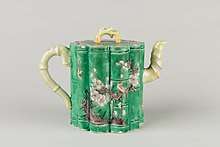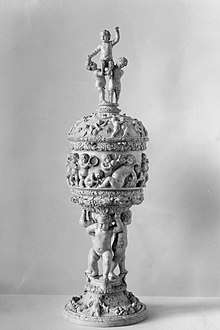Mary Clark Thompson
Mary Clark Thompson (1835 – July 28, 1923), born Mary Lee Clark, was a noted philanthropist and wife of banker Frederick Ferris Thompson.
Early years
Mary Lee Clark was born in Naples, New York in 1835 to Myron Holley Clark (1806–1892) and Zilpha (née Watkins) Clark (1806–1877). She moved with her family to Canandaigua, New York when she was about two years old.[1]
She attended various schools in Ontario County, including the Ontario Female Seminary.[2] Mary's father Myron was elected Governor of New York State in 1855, and the family took up residence in Albany, the state's capital.[1]
Personal life


While in Albany, Mary met her future husband, Frederick Ferris Thompson, son of prominent New York banker John Thompson. The couple were married on June 17, 1857 in Canandaigua. Frederick, his brother Samuel, and their father founded First National Bank of the City of New York (a predecessor to today's Citibank) and Chase National Bank of the City of New York (a predecessor to today's JPMorgan Chase Bank).[3]
Although the Thompson's principal residence was at 283 Madison Avenue in New York City, the couple spent their summers in Mary's girlhood home of Canandaigua on an estate they purchased in 1863. The estate was named Sonnenberg (means "sunny hill" in German) when they purchased it. In 1885, they tore down the farmhouse and replaced it with a 40-room Queen-Anne style mansion.[4]
Philanthropy and later life
The Thompsons became generous benefactors to multiple organizations and established themselves as philanthropists. Some of the more notable institutions benefited by Thompson endowments and donations include Williams College, Vassar College, and Teacher's College (now Columbia University). Mrs. Thompson was one of the founders of the Metropolitan Museum of Art,[5] and a great benefactor to the Bronx Zoo and Woman's Hospital.[6]
Her husband died in 1899 at age 62 in New York City,[7] and Mary continued to make Sonnenberg her summer home. She continued to give generously to civic, religious, and educational institutions, though her philanthropic work focused principally on the community in which she lived. In Canandaigua, she established and built the F.F. Thompson Hospital in 1903 and the Woodlawn Cemetery chapel, and a swimming school on the shore of Canandaigua Lake. She established a retirement home which she named Clark Manor House after her parents. She donated land and money for the city's post office, and contributed heavily to the local Ontario County historical society, the Wood Library, and numerous local churches.
Her interests also included enjoyment of gardens, and she had nine formal gardens built at Sonnenberg. Often she would allow the public to come on the property and walk through her gardens.[1]
Mary died on July 28, 1923 at age 87 at Sonnenberg.[1] Mary and Frederick, who had no children, are both interred at Woodlawn Cemetery in Canandaigua.[8]
Honors and Legacy
She also maintained an interest in preserving the history of Native Americans in the New York area, and made multiple contributions to the State Museum in Albany for that purpose. In 1920 she was awarded the Cornplanter Medal for her work in this field.[9]
Her home, Sonnenberg, is preserved and operated as a historic house museum.[4]
The Mary Clark Thompson Medal is named for her. It has been awarded since 1921 by the American National Academy of Sciences for work in geology and paleontology.[10]
References
- "MARY C. THOMPSON DEAD.; Philanthropist Dies at Her Canandaigua Estate at 87 Years" (PDF). The New York Times. 29 July 1923. Retrieved 13 November 2019.
- "Thompson, Mary Clark (1835-1923)". specialcollections.williams.edu. Special Collections, Williams College. Retrieved 13 November 2019.
- Redlich, Fritz (1951). The Molding of American Banking: 1840-1910. Hafner. p. 111. Retrieved 12 November 2019.
- "Mary Clark Thompson". sonnenberg.org. Sonnenberg Gardens and Mansion. March 10, 2003. Archived from the original on December 12, 2004. Retrieved February 10, 2016.
- "A FAN OF VICTORIA IN MUSEUM HERE; The Metropolitan Places on View Art Bequeathed by Mrs. Mary Clark Thompson" (PDF). The New York Times. 22 December 1924. Retrieved 13 November 2019.
- "WILL GIVES CHARITY NEARLY $5,000,000; Mrs. Mary Clark Thompson, Widow of New York Banker, Aids Institutions Here. OLD SERVANTS REWARDED Relatives Get Residue of Estate, Which Amounts to Another $5,000,000 -- Colleges Enriched" (PDF). The New York Times. 17 August 1923. Retrieved 13 November 2019.
- "WILL OF F.F. THOMPSON FILED.; Value of the Estate Is $3,000,000, All Left to the Widow" (PDF). The New York Times. 25 April 1899. Retrieved 12 November 2019.
- "CONTEST LEGACIES TO THIRTY WORKERS; Executors of Mary Clark Thompson's $10,000,000 Estate Oppose $200,000 Award" (PDF). The New York Times. 26 September 1925. Retrieved 13 November 2019.
- Starr, Frederick (December 1929). "The Later Awards of the Cornplanter Medal". The Open Court. Open Court Publishing Company. 43 (883): 749–755. Retrieved January 9, 2016.
- Sciences (U.S.), National Academy of (1923). Report of the National Academy of Sciences. U.S. Government Printing Office. p. 43. Retrieved 13 November 2019.